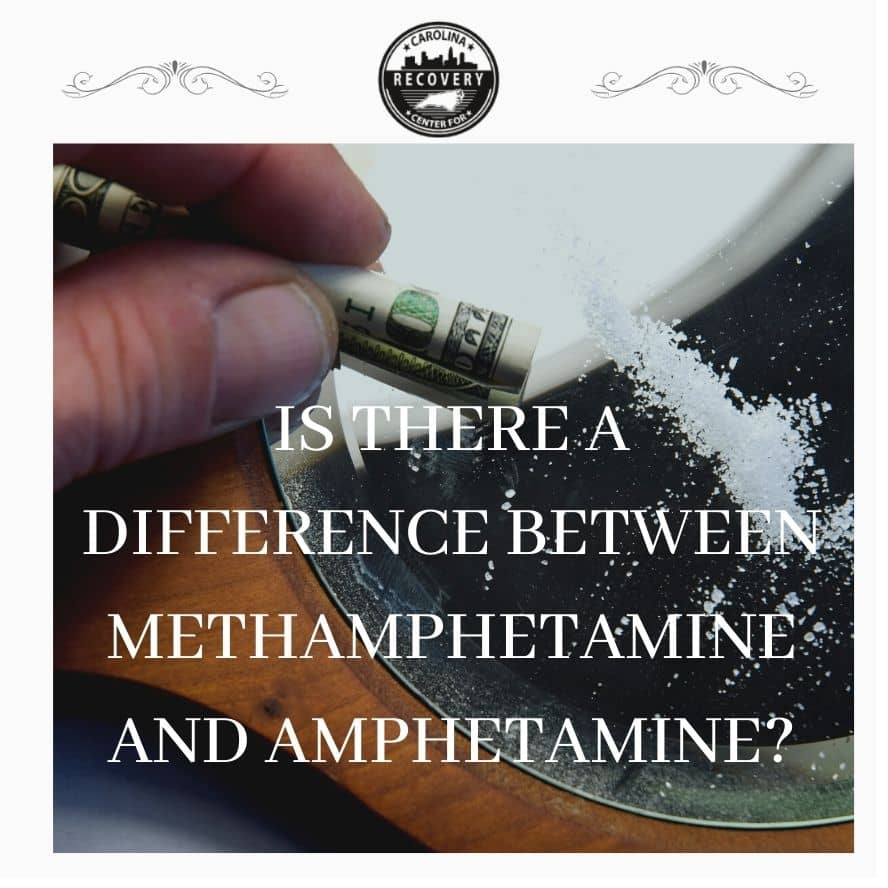Is There a Difference Between Methamphetamine and Amphetamine?

Medically Verified: 2/1/24
Medical Reviewer
Chief Editor

All of the information on this page has been reviewed and verified by a certified addiction professional.
Amphetamines are a class of prescription stimulant drugs used to treat conditions like ADHD or narcolepsy. Methamphetamine, on the other hand, is an illicit stimulant drug that has no medicinal use. While these two substances are different, they both have a propensity for addiction and are classified as Schedule II drugs by the DEA.
Both methamphetamine and amphetamine are stimulants, which means they have similar effects on the body. Stimulants are known to speed up the central nervous system, meaning they cause symptoms like increased respiratory rates, increased heart rates, and a rise in blood pressure. Stimulant drugs can also cause an increase in focus, which are why the legal forms of stimulants are used to treat conditions like ADHD.
While there are many similarities between methamphetamine and amphetamine, there are some key differences.
What is Methamphetamine?
Methamphetamine was developed in the 20th century and is derived from its parent drug, amphetamine. Originally, this substance was used in nasal decongestants and inhalers. However, because of the addictive nature of methamphetamine, it is rarely used for medicinal purposes.
Meth is a highly powerful stimulant drug that is known for the energy and euphoria it can cause. Many people who try this substance once or twice admit to becoming addicted almost immediately. This makes methamphetamine extremely dangerous.
According to the National Institute on Drug Abuse, “Methamphetamine has been classified by the U.S. Drug Enforcement Administration as a Schedule II stimulant, which makes it legally available only through a nonrefillable prescription.”[1] While methamphetamine (Desoxyn) is rarely prescribed, it may be used to treat ADHD or as a short-term component of weight loss programs.
The Symptoms of Meth Abuse
Methamphetamine is known on the street as meth, crank, ice, tina, or Christina. This drug is most commonly abused by smoking, snorting, swallowing, or injecting. This illicit stimulant drug is made up of amphetamine and a mixture of a variety of household items like drain cleaner, battery acid, or paint thinner – which are all toxic to the human body.
Upon initial use, individuals experience an intense rush of energy, confidence, and euphoria. However, it is extremely common for people who abuse this drug to become anxious, paranoid, and even violent towards themselves or others. When the substance wears off, people experience a crash that is characterized by feelings of lethargy, insomnia, cravings, confusion, and anxiety.
Signs of methamphetamine abuse include:
- Paranoia
- Hallucinations and delusions
- Irritability
- Skin sores
- Staying awake for days at a time
- Sudden weight loss
- Nervous or anxious behavior
- High-risk behavior
- Hyperactivity
- Hypersexuality
- Sunken in skin
- Severe tooth decay
What is Amphetamine?
Amphetamines are medications that stimulate the central nervous system through neurotransmitters like dopamine and norepinephrine. These medications are often prescribed to treat attention-deficit hyperactivity disorder (ADHD) or narcolepsy.
Some examples of amphetamine medications include:
While these substances have medicinal uses, individuals often abuse them to study for tests in school or to party. This is because they provide a lot of energy and focus, allowing people to stay up for long hours. In fact, about 13% of college students in America admitted to using amphetamines as study drugs.[2]
Amphetamines work by increasing the amount of dopamine in an individual’s brain. Because of this dopamine release, people who do not need the medication may become trapped in a cycle of reward-seeking behavior. This is what causes amphetamine addiction.
The Symptoms of Amphetamine Abuse
While amphetamines can be extremely helpful for people with mental health conditions like ADHD, they can also be abused. Amphetamines are only legal to obtain with a prescription. When someone is abusing an amphetamine, they are most likely buying them off of the street or from a friend who has a prescription for the medication.
Amphetamines can cause a lot of similar effects as methamphetamine when abused. For example, some of the long-term effects of amphetamine abuse include:[3]
- Appetite decrease and weight loss
- Heart problems such as fast heart rate, irregular heartbeat, increased blood pressure, and heart attack
- High body temperature and skin flushing
- Memory loss problems thinking clearly, and stroke
- Mood and emotional problems such as aggressive or violent behavior, depression, and suicide
- Ongoing hallucinations and inability to tell what is real
- Restlessness and tremors
- Skin sores
- Sleep problems
- Tooth decay
- Death
When someone abuses amphetamine drugs, they will experience an initial increase in energy. This could cause erratic behavior or impulsiveness that causes people to get themselves into dangerous situations. Additionally, people can experience a form of substance-induced psychosis if they take too much amphetamine at once.
Other symptoms of amphetamine abuse include:
- Irritability
- Disrupted sleeping patterns or insomnia
- Weight loss
- Headaches
- Numbness in arms or legs
- Hostile or aggressive behavior
- Exhaustion due to crashing
- Diarrhea or constipation
- Verbal or muscle tics
- Dizziness
- Memory loss
- Impulsive behaviors like spending too much money, reckless driving, or unsafe sex
Finding Help for Prescription or Illicit Stimulant Abuse
If you or a loved one abuses prescription amphetamine drugs or illicit stimulants like methamphetamine, it’s time to seek professional help. The consequences of stimulant drug abuse can be extensive, including tooth decay and life-threatening overdoses.
Contact Carolina Recovery Center today to learn more about our stimulant drug addiction treatment program.
References:

